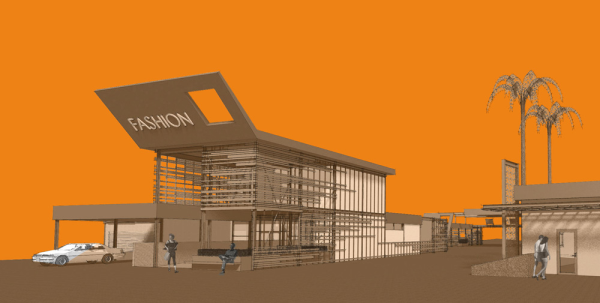Just How Commercial Architects Can Transform Your Service Space With Professional Design Providers
Commercial architects play a crucial role in improving service environments. Their expertise in style can considerably improve both functionality and visual appeals. By creating areas that reflect a brand's identification, they boost operational effectiveness and staff member contentment. The effect of their work extends beyond simple appearance. Understanding the subtleties of partnership and sustainability can bring about transformative results. What particular elements make these transformations successful?
Recognizing the Duty of Commercial Architects
Commercial architects play an important duty in shaping service environments that are both practical and visually pleasing. They specialize in creating areas customized to the specific requirements of organizations, making certain that every square foot is used effectively. These specialists integrate elements such as spatial design, illumination, and products to improve efficiency and worker health. By working together with customers, commercial architects gather insights into functional requirements and brand name identification, translating these right into ingenious designs.Additionally, they navigate complicated structure codes and zoning regulations, making sure compliance while optimizing layout potential. Their knowledge includes sustainability methods, promoting power effectiveness and ecologically pleasant materials in their tasks. Via their imaginative vision and technical expertise, industrial architects not only produce enticing areas however additionally foster settings that advertise collaboration and development. Eventually, their payments considerably impact the general success and picture of an organization.
Benefits of Professional Style Solutions

Customizing Rooms to Your Brand Identity
Customizing areas to a brand name's identification is vital for conveying its core values and objective. Commercial architects play a critical function in enhancing an organization's visual identification with thoughtful style choices. By straightening building aspects with brand name principles, companies can produce atmospheres that resonate with clients and employees alike.
Mirroring Brand Values
How can a well-designed space personify a business's core worths? Commercial architects play a vital role in forming environments that resonate with a brand name's identification. By integrating aspects such as shade systems, materials, and designs, they develop areas that reflect the significance of business. A technology firm might opt for open layouts and modern furnishings to communicate advancement and collaboration, while a luxury brand name may select sophisticated surfaces and intimate spaces to stimulate exclusivity and class. Thoughtful layout not just improves capability however additionally cultivates a strong connection between staff members, clients, and the brand name. Eventually, a well-crafted atmosphere works as a concrete representation of a firm's mission and vision, strengthening its worths at every touchpoint.
Enhancing Visual Identity
What aspects can properly boost a brand's aesthetic identity within a commercial room? Commercial architects play an essential function in integrating design attributes that reverberate with a business's values. Color design, typography, and materials can be purposefully selected to reflect brand name worths while making sure aesthetic allure. Furthermore, integrating logos and brand images right into the style can produce a cohesive visual narrative. Illumination layout can better boost the ambience, guiding client assumptions and experiences (commercial architects). Design and furniture selections should straighten with the brand name's individuality, whether it's modern, traditional, or innovative. Eventually, a properly designed industrial area not only draws in clients however likewise enhances brand name acknowledgment, developing a lasting perception that promotes loyalty and engagement
Enhancing Performance and Effectiveness
Enhancing performance and performance in commercial rooms includes maximizing room application and designing process that streamline procedures. Architects focus on developing designs that minimize wasted area while facilitating smooth adjustments between jobs. This strategy not only enhances productivity but also adds to a much more natural workplace.
Optimizing Area Application
Reliable space utilization is a crucial variable in commercial architecture, where the design needs to stabilize aesthetics with functionality (commercial architects). Architects employ numerous approaches to make the most of offered square footage while guaranteeing that each location serves a distinctive purpose. By examining workflow, web traffic patterns, and user requirements, architects can develop layouts that boost both worker productivity and customer experience. Multi-functional areas, adaptable furnishings plans, and maximized storage services are crucial parts in attaining this goal. Additionally, integrating all-natural light and open spaces promotes a more inviting atmosphere, additional elevating the utility of the environment. Ultimately, reliable space utilization not just boosts functional efficiency but additionally contributes positively to the total brand name image, making it a vital factor to consider in business style
Structured Operations Style
Just how can a properly designed process transform a business room into a hub of productivity? Structured process design you can check here focuses on enhancing the physical format and functional processes within a company atmosphere. By strategically setting up workstations, conference locations, and sources, architects can remove unneeded motion and boost collaboration. This thoughtful layout minimizes distractions and promotes communication, allowing employees to concentrate on their tasks more efficiently. Furthermore, integrating technology right into the process can even more automate processes, lowering time invested in regular tasks. Therefore, services experience improved staff member spirits and boosted output, developing a dynamic environment that promotes technology. Ultimately, buying structured operations design not only improves functionality however also positions a commercial area for sustainable growth and success.
Promoting Cooperation Via Layout
Although contemporary work areas often prioritize specific performance, the design of business areas progressively emphasizes collaboration as an essential motorist of technology and group communication. Architects play a vital duty in developing atmospheres that promote communication amongst staff members. Open formats, multifunctional rooms, and purposefully put public locations motivate spontaneous discussions and brainstorming sessions.Incorporating components such as movable furniture and adaptable conference room permits teams to reconfigure rooms based upon their collaborative demands. Additionally, integrating modern technology, like interactive white boards and video clip conferencing devices, improves the capacity to interact properly, despite location.Natural light and biophilic style elements also contribute to a more inviting environment, advertising convenience and wellness, which are vital for effective teamwork. By concentrating on these aspects, industrial architects can create vibrant atmospheres that not only improve collaboration but additionally drive general company success.
Lasting Design Practices in Commercial Design

Instance Researches: Successful Transformations by Commercial Architects
The execution of sustainable design methods has not only reshaped the approach to commercial architecture but has actually likewise resulted in impressive changes in different organization areas. One remarkable instance is the redesign of a tech company's headquarters, where architects incorporated natural light and environment-friendly wall surfaces, leading to improved worker wellness and efficiency. This improvement lowered energy prices by 30% and enhanced the business's public image.In one more circumstances, a retail shop underwent a total overhaul, making use of recovered materials and energy-efficient systems. This not only drew in eco-conscious customers yet also boosted foot web traffic by 25%. A 3rd case entailed a corporate workplace that welcomed an open-plan layout with versatile workspaces, promoting partnership among teams. The architects' focus on creating a dynamic and versatile setting considerably boosted staff member complete satisfaction. These study exemplify how business architects can produce impactful spaces that go to this web-site align with business goals and sustainability efforts.
Frequently Asked Concerns
Just How Much Do Commercial Architecture Solutions Generally Cost?
The cost of commercial style services varies commonly, typically varying from $100 to $250 per hour. Factors affecting rates include project intricacy, place, and the architect's experience, making it vital for businesses to get in-depth quotes.
What Kinds Of Organizations Benefit Many From Commercial Architects?
Different services, including retail, friendliness, and business workplaces, substantially take advantage of business architects. These professionals improve capability, visual appeals, and brand identity, guaranteeing rooms are maximized for customer engagement and employee performance, inevitably fostering service growth.
For how long Does a Business Style Task Generally Take?
The timeline for a commercial layout task typically ranges from several weeks to numerous months. Factors affecting period include task intricacy, regulative authorizations, and partnership amongst stakeholders, all of which can influence total visit this page conclusion time.
Can I Employ a Commercial Engineer for Improvements Just?
Yes, employing a business architect for remodellings is possible. Lots of architects specialize in renovation projects, giving know-how in optimizing existing rooms while sticking to laws and boosting functionality, appearances, and general worth of business atmosphere.
What Qualifications Should I Try to find in an Industrial Designer?

Comments on “How commercial architects Bridge Aesthetics and Functionality”